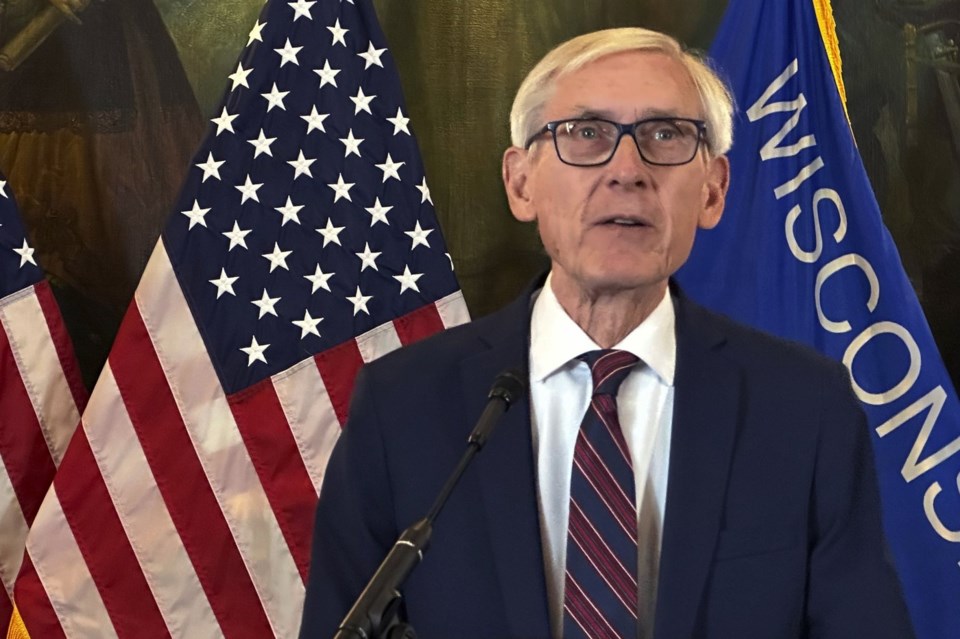MADISON, Wis. (AP) — Wisconsin Gov. Tony Evers' plan to let voters without legislative involvement met opposition on Monday from Republican leaders of the Legislature, who signaled that the idea is likely to be rejected for a second time.
Evers' plan comes the same day the Legislature kicked off its two-year session. Republicans remain in control, but their majority is at its narrowest since they took over in 2011.
That means the dynamic between the Legislature and Evers, entering his seventh year as governor, will largely remain as it has been. Republicans must approve anything Evers wants to get done.
Still, the Democratic Evers is reviving a plan previously rejected by Republicans giving voters the power to enact laws without approval of the Legislature.
Evers said on Friday that the state budget he plans to unveil next month will include a mandate that legislators take up a constitutional amendment allowing voters to petition for ballot proposals to repeal state statutes and create new ones. Evers made a similar proposal in 2022 for voters to repeal the state’s 1849 abortion ban, but Republicans killed the plan.
Republican Assembly Speaker Robin Vos rejected the idea.
“It appears that Tony Evers' single agenda item for the next session to is take power away from the elected members of the Legislature,” Vos told The Associated Press. “If that's his focus, it's going to make it awfully hard to find consensus.”
Republican Senate Majority Leader Devin LeMahieu said in a statement that Evers should focus on cutting taxes and scaling back the size of government.
Republicans hold a 54-45 advantage in the Assembly and an 18-15 majority in the Senate in the two-year session that started Monday.
There are six new state senators, all Democrats. Nearly a third of the Assembly — 31 lawmakers — are newly elected. Of them, 23 are Democrats. Those new lawmakers make up the majority of the 45-member Democratic caucus.
Lawmakers have said the slimmer GOP majorities will lead to more compromise, but on this issue they don't appear to be willing to go along with what Evers wants.
Wisconsin is one of 24 states that do not provide a way for people to reject or enact statutes outside of the legislative process, according to Ballotpedia.
Evers said Republicans have been ignoring the will of the people by refusing to legalize marijuana, repeal the abortion ban, implement gun control measures and increase funding for public schools. Instead, he said, the GOP has been enacting policy through constitutional amendments, denying voters a voice.
“Republican lawmakers are going to continue to try to legislate by constitutional amendment,” Evers said. “Then they should give Wisconsinites the same opportunity that 26 other states have.”
Constitutional amendments must pass two consecutive legislative sessions and a statewide referendum to take effect. The governor plays no role in the process.
Republicans have asked voters to approve seven amendments since 2010, according to data from the University of Wisconsin Law School’s State Democracy Research Initiative. Voters ratified three in 2024 alone, including two in April to restrict use of private money in election administration and one in November that prohibits foreign nationals from voting.
Republicans plan to give final passage this month to another amendment that would put the state's voter ID requirement in the constitution, rather than just state law. The Senate is expected to pass it this week, followed by the Assembly next week, which would then put the question on the April election ballot.
Gun control advocates gathered in the Capitol on Monday shortly before the session kicked off to press lawmakers to take action by a 15-year-old student on Dec. 16 at a Madison private school that left a teacher and student dead and two other students severely injured. The shooter killed herself.
Evers called a special session in 2019 in an attempt to pass gun control measures, including requiring universal background checks, but Republicans took no action.
Evers also called a special legislative session in September 2022 to approve a constitutional amendment similar to his latest proposal. He promoted it as and ensure abortion remained legal in Wisconsin after the U.S. Supreme Court reversed its landmark Roe v. Wade decision.
Republicans convened and ending the special session in less than 30 seconds.
Todd Richmond And Scott Bauer, The Associated Press




